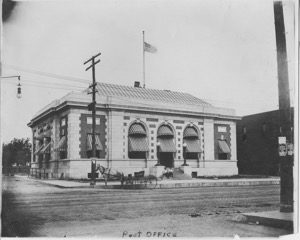
Built in 1910, the Greenville Post Office was constructed at a site on Lee Street, that was chosen for its proximity to the railroad depot.
Remember when you went to the post office, not only to collect your mail, but also to visit with friends and learn what was going on in town. Post offices have always fascinated me. Some such as the one in Farmersville have impressive murals done during the Depression by WPA artists. Many were grand buildings known as Federal Buildings, if the military recruiters or IRS had offices there. Others were still a little corner of the local store.
The post office and the role of the Post Master General have been important fixtures in U. S. history since Benjamin Franklin was appointed Post Master in 1775. Andrew Jackson was the first president to add the position to his cabinet. With the creation of the US Postal Service (USPS) in 1971, the Postmaster General became CEO of USPS, and officially left the presidential cabinet.
The Post Master General was usually the only cabinet member the average person could name in the 19th and early 20th Centuries. Here in North Texas mail was expensive and difficult to receive. Before the Civil War, mail carriers on horseback left Clarksville, the largest town around, on Monday. He dropped off any mail for Hunt County residents at a local store in Greenville before making his way to Dallas. There he picked up a new (actually at least one month old) batch of mail and returned to Clarksville. Along the way, he again stopped in Greenville.
But post offices and banks were often targets of outlaws or even white-collar crime. They were repositories of money orders, a form of monetary transfer used for many years before credit or debit cards were even imagined. With no ID required, a person could steal money orders, go ten miles down the road, cash them and seldom get caught.
Such was the case of a post master/store keeper in Paynetown in the late 1880s. When his allotment of money orders arrived from Washington, he set a few aside for himself. After a while, the postal officials were suspicious, traced records as only Feds can do, and sent the gentleman up to Leavenworth for an extended stay in the federal penitentiary.
When the classical Beaux Arts Post Office was built on Oswin King’s lot on Lee Street, the site was chosen for its proximity to the railroad depot. Every time a delivery of money orders arrived, an armed guard escorted the goods and the post office employee back to the safe at the post office. As far as I know, there were no armed robberies or misappropriation of federal funds dealing with money orders in Greenville.
My paternal grandfather was a rural mail carrier from 1920 until retirement in 1953. I was visiting my grandparents about 1981 and wishing I knew more about my maternal grandmother. My granddad suggested we drive up to Dundee, a tiny village in Wichita County. He assured me that the postmaster or postmistress knew every thing that went on in town. I was skeptical, to say the least. But the postmistress in Dundee grew up with my grandmother, remembered her well, and knew all the family. She graciously shared my family history with my granddad and me for two hours. Then she called a friend to meet us at the cemetery to show me where my great-grandmother was buried. How could I not love post office employees?
